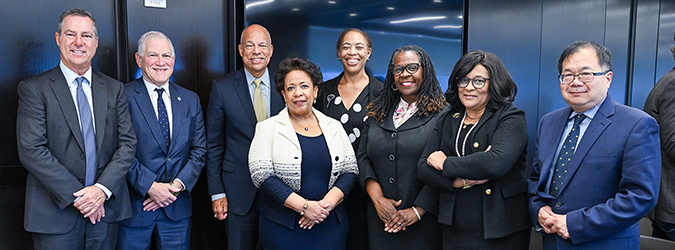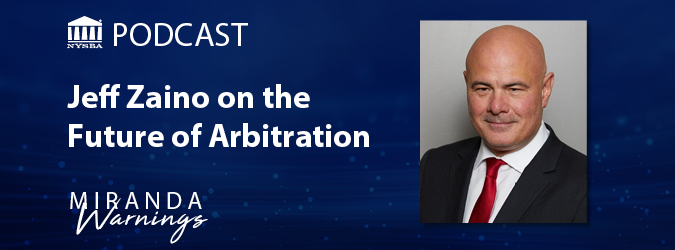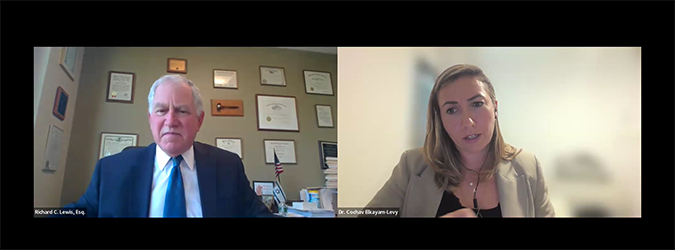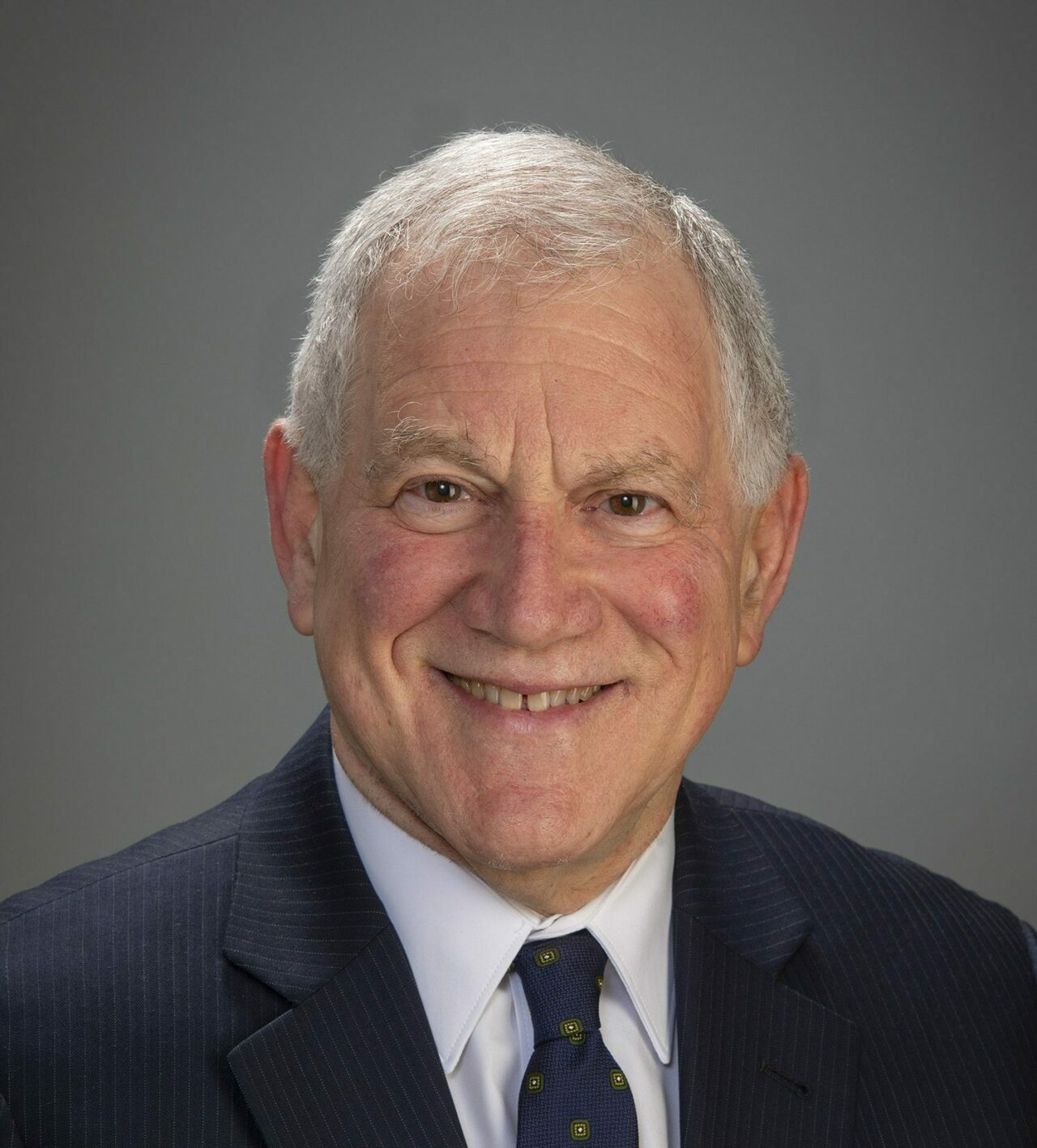Eliminating Standardized Test Requirements, Ending Legacy Admissions Key To Diversity In Wake of U.S. Supreme Court Ruling
9.20.2023

Co-Chairs Brad Karp, Jeh Johnson and Loretta Lynch with President Richard Lewis and members of the Task Force on Advancing Diversity. Photo credit: David Handschuh/OCA
In the aftermath of the U.S. Supreme Court ruling on affirmative action, colleges and graduate schools that want to achieve diversity should eliminate the preferential treatment in admissions given to athletes, the children of alumni and the family of donors, the New York State Bar Association said in a report approved by its Executive Committee today.
The report of the association’s Task Force on Advancing Diversity also recommends that institutions of higher education move away from standardized tests and grade point averages and focus instead on how an applicant furthers a college’s or law school’s goals and values. The report is in response to the U.S. Supreme Court decision in Students for Fair Admissions, Inc. v. President and Fellows of Harvard College and Students for Fair Admissions, Inc. v. University of North Carolina. The court ruled in June that race-conscious admissions policies at the two universities are unconstitutional.
“The Students for Fair Admissions decision is today the law of the land and must be followed,” the task force said in its report. “The question now is where do those in higher education, business, the legal profession, and the judiciary go from here?”
The 50-member task force – chaired by former Homeland Security Secretary Jeh Johnson, former U.S. Attorney General Loretta Lynch and Brad Karp, chair of Paul, Weiss – examined the impact the U.S. Supreme Court ruling will have on colleges, law schools, corporations, law firms and courts. Distinguished task force members include the chairs of 16 major law firms, the chief legal officers of ten large corporations, five of New York’s eminent judges and the deans of Columbia and NYU law schools.
“As colleges and law schools begin selecting their classes this fall, they can look to the exhaustive analysis of our esteemed task force to guide them in determining what admissions procedures are still permitted in light of the U.S. Supreme Court decision on affirmative action,” said Richard Lewis, president of the New York State Bar Association. “While race-conscious policies were found to be unconstitutional, institutions of higher education still have wide latitude to look at the impact of race on an individual applicant as long as race in and of itself isn’t the reason for admissions.”
The report also recommends employing race-neutral strategies for achieving diversity such as admitting the highest-ranking student at every high school in the state, considering a student’s socioeconomic status in admissions decisions, and factoring in the more difficult path to academic achievement a first-generation college applicant had to take. Increasing the availability of financial aid, providing diverse mentors, and targeting scholarships for low-income students could also help increase diversity.
“As we noted in the task force report, regrettably in 2023 it is still the impulse of many in America to self-segregate – where we live, where we worship and with whom we socialize.” Johnson said. “For many generations of American teenagers, higher education has been the first opportunity to broaden their horizons by living, socializing and learning with those different from themselves. And over recent years diverse student bodies at colleges and universities have led to more diverse professions.”
Lynch, co-chair of the task force and now a partner at Paul, Weiss, said the task force moved extremely quickly to make sure that corporations and institutions of higher education did not dismantle lawful diversity programs that are still permissible under the U.S. Supreme Court ruling.
“The diversity, equity, and inclusion initiatives that have been developed by corporations and colleges over the past several decades have become part of the fabric of our society because they benefit all of our society,” Lynch said. “A breadth of options remains for these organizations, who recognize that although talent is found throughout all our communities, equal opportunity is not. Our task force focused on this important issue because the American values of equity and fairness must be preserved.”
Corporations and Law Firms
The task force’s working groups on corporations and law firms examined the impact of the U.S. Supreme Court ruling on corporate diversity initiatives. They concluded that corporate diversity efforts continue to be lawful if the DEI programs comply with federal anti-discrimination statutes such as Title VI and Title VII of the Civil Rights Act, and 42 U.S.C. § 1981.
While DEI has been subjected to shareholder challenges, reverse discrimination litigation and government investigations, the report suggests weighing those risks against the downside of foregoing those efforts. Companies that abandon their public commitments can be subject to SEC investigations, shareholder derivative suits and discrimination actions.
“Law firms and corporations that fail to prioritize diversity do so at their own peril. They will lose the talent war, suffer financial consequences and fall behind their competitors,” Karp said. “Even more important, supporting diversity, equity and inclusion is the right thing to do, morally and ethically.”
Corporations can also turn to ideas that go beyond affirmative action such as pipeline programs, affinity or employee resource groups, fellowships, scholarships, mentorships, and sponsorships. These DEI efforts are targeted at increasing the number of diverse applicants and retaining diverse employees. Traditionally, such programs have been considered lawful under Title VII, the report states.
The Judiciary
The court system should encourage diverse candidates to apply, require bias training for judges, court personnel, and jurors; and work with bar associations and affinity groups to publicize pathways to becoming a judge. In addition, courts should recruit in communities with higher percentages of underrepresented groups and ensure that job postings are inclusionary.
“Plain language and inclusive wording in job postings can positively influence the diversity and inclusivity of applicant pools and promote fairer recruitment practices,” the report states. “Posting opportunities in LGBTQ+ centers, historically black colleges and universities, bar associations, fraternal organizations, faith communities, local colleges, career fairs and social media will also aid in attracting diverse applicants.”
Judges and court staff should also:
- Support measures that create equal opportunities for diverse attorneys to take on lead roles in their courtrooms.
- Ensure that they have clear policies and protocols for investigating claims of bias, harassment and discrimination.
- Display photographs, portraits, and artwork that convey the message that everyone is welcome.
In addition to Karp, the law firm chairs on the task force are:
- Neil Barr, chair and managing partner, Davis Polk.
- Barbara Becker, chair and managing partner, Gibson, Dunn & Crutcher.
- Bradley Butwin, chair, O’Melveny & Myers.
- Anne Clark, managing partner, Vladeck, Raskin & Clark.
- Eric Friedman, executive partner, Skadden.
- Peter Furci, presiding partner, Debevoise & Plimpton.
- Michael Gerstenzang, managing partner, Cleary Gottlieb.
- David Greenwald, chair, Fried Frank.
- Adam Klein, managing partner, Outten & Golden.
- Kim Koopersmith, partner and chair, Akin.
- Anthony Lupo, chair, ArentFox.
- Julie Jones, chair, Ropes & Gray.
- Alden Millard, partner and chair of the executive committee, Simpson Thacher.
- Faiza Saeed, presiding partner, Cravath.
- Barry Wolf, executive partner, chair of the management committee, Weil, Gotshal & Manges.
The general counsel/chief legal officers of 10 large corporations/government entities on the task force are:
- Nishka Chandrasoma, vice president, chief legal officer and secretary, Ford Foundation.
- Deneen Donnley, senior vice president and general counsel, Con Edison.
- Stacey Friedman, executive vice president and general counsel, JP Morgan Chase.
- Jose Gonzalez, chief legal officer and corporate secretary, equitable holdings, Equitable.
- Eric Grossman, chief legal officer and chief administrative officer, Morgan Stanley.
- Kimberley Harris, executive vice president of Comcast Corporation and general counsel, NBCUniversal.
- Sandra Leung, executive vice president and general counsel of Bristol-Myers Squibb and the president of the National Asian Pacific American Bar Association.
- Kapil Longani, senior vice chancellor for legal affairs and general counsel, State University of New York.
- Deirdre Stanley, executive vice president/general counsel, Estee Lauder.
- Julie Swidler, executive vice president of business affairs and general counsel for SONY Music Entertainment.
The task force also includes prominent judges, academics, and attorneys:
- Roger Blissett, head of government affairs at MUFG Bank.
- Andrew Brown, former vice chancellor of the New York Board of Regents, managing partner at Brown Hutchinson and past NYSBA president.
- Associate Justice Cheryl Chambers, Appellate Division, Second Department.
- Vincent Chang, partner, Wollmuth Maher & Deutsch.
- Mike Delikat, former chair of Orrick’s global employment law practice and a partner in the New York office.
- Lissette Duran, senior counsel, Paul, Weiss.
- Lara Flath, partner, Skadden.
- Jonathan Katz, partner and co-chair of the diversity committee, Cravath.
- Marvin Krislov, president, Pace University.
- Gillian Lester, dean and Lucy Moses professor of law, Columbia Law School.
- Troy McKenzie, dean and Cecelia Goetz professor of law, New York University School of Law.
- Alicia Ouellette, former dean, Albany Law.
- Judge Edwina Richardson-Mendelson, chief administrative judge for justice initiatives, New York State Unified Court System.
- Supervising Judge of the Family Court Richard Rivera, acting Supreme Court justice, Albany County, and co-chair of the Franklin Williams Judicial Commission.
- Jill Rosenberg, New York employment law partner, Orrick.
- Zakiyyah Salim-Williams, partner and chief diversity officer, Gibson, Dunn & Crutcher.
- Jason Schwartz, partner, Gibson, Dunn & Crutcher.
- Kathleen Sweet, partner, Gibson, McAskill & Crosby.
- Caren Ulrich Stacy, founder & CEO, Diversity Lab.
- Liza Velazquez, partner, Paul, Weiss.
- Associate Justice Lillian Wan, Appellate Division, Second Department.
- Associate Justice Troy Webber, Appellate Division, First Department.






